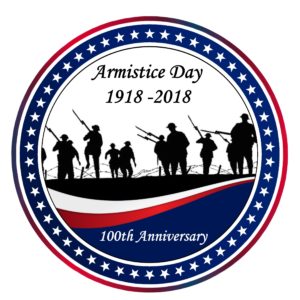By Ed Thompson
 One hundred years ago this coming Sunday, World War I ended. On the eleventh hour of the eleventh day of the eleventh month of 1918, the fighting stopped. For many of our churches in 2018, that’s the time when their worship services will start.
One hundred years ago this coming Sunday, World War I ended. On the eleventh hour of the eleventh day of the eleventh month of 1918, the fighting stopped. For many of our churches in 2018, that’s the time when their worship services will start.
World War I has been called the “Great War” as well as “the war to end all wars.” Greatness, of course, is hard to measure, whether we’re talking about movies, rock stars, baseball players, or global conflicts. Some estimate that 16 million people died in World War I. World War II far surpassed that with estimates as high as 60 million deaths. World War I certainly didn’t end all wars either, as World War II started less than 11 years after the armistice was signed.
It would be easy to overlook this anniversary. For many churches, this may be the climax of or at least a significant part of their stewardship campaign. Some may use this day as part of an extended focus on Thanksgiving. Others may choose to honor their members who are veterans. Especially as the number of men and women who served during World War II and the Korean War die off, that kind of recognition may well be very meaningful. It’s not that these are bad things to do.
Maybe it’s just me, but the coincidence of the eleventh hour of the eleventh day of the eleventh month as the end of the war and the start of many of our worship services just seems too striking to ignore. (OK, it’s not exactly the same time. I know the fighting didn’t stop at 11 a.m. Eastern Standard Time. Nevertheless, I still find the coincidence striking.)
So, how might we remember that day? Perhaps we could take a moment of silence sometime during the service (11:11 a.m.?) to remember those who died in the war. We could reflect on unintended consequences. The assassination of a minor archduke in a small town in an insignificant part of a large country turned into a global conflict because of the system of alliances that the European nations had set up. Although done with good intentions, there was a domino effect started by this shooting that drew nations into a widening conflict that, all things considered, they would have preferred to avoid. We don’t always foresee the effect that our promises and pledges might have.
The desire that that this would be the war to end all wars also led some to overlook the rise of Adolph Hitler and others to make significant concessions to Germany (partially as a way of making up for the harsh terms of the armistice) in hopes that another global conflict could be avoided. What signs of trouble do we overlook? Climate change maybe or perhaps voter suppression? What are some ways we compromise with evil? For some partisan commentators, any political compromise is considered evil. Maybe we need to spend time considering what constitutes evil. Maybe that would help us move beyond the political divisions reflected in this last election cycle.
Even if World War I wasn’t the war to end all wars, what would it take to end war? In some ways, it seems like we’re in an endless war. Maybe the Cold War has ended (but maybe not), yet there’s still the war on terrorism, the war on drugs, the war on crime, and all kinds of trade wars, as well as the war on poverty (although maybe we’ve given up on that one since poverty seems to have won). And maybe more than other countries, we seem to be at war with ourselves. What would it take for us to stop fighting each other? What would it take for us to recognize the humanity of our enemies as well as to acknowledge our own anger, fear, and complicity in the problems of our country?
World War I ended with the dream that the nations of the world could live together, that they could learn from the mistakes of the past so they would be able to avoid in the future the senseless slaughter that had cost so many lives. What, if anything, have we learned 100 years later? Unfortunately, maybe we haven’t really learned all that much. But this Sunday gives us a chance to reflect and remember that great conflict and to consider how the one we call the Prince of Peace would have us do things differently so that this kind of conflict never happens again.
